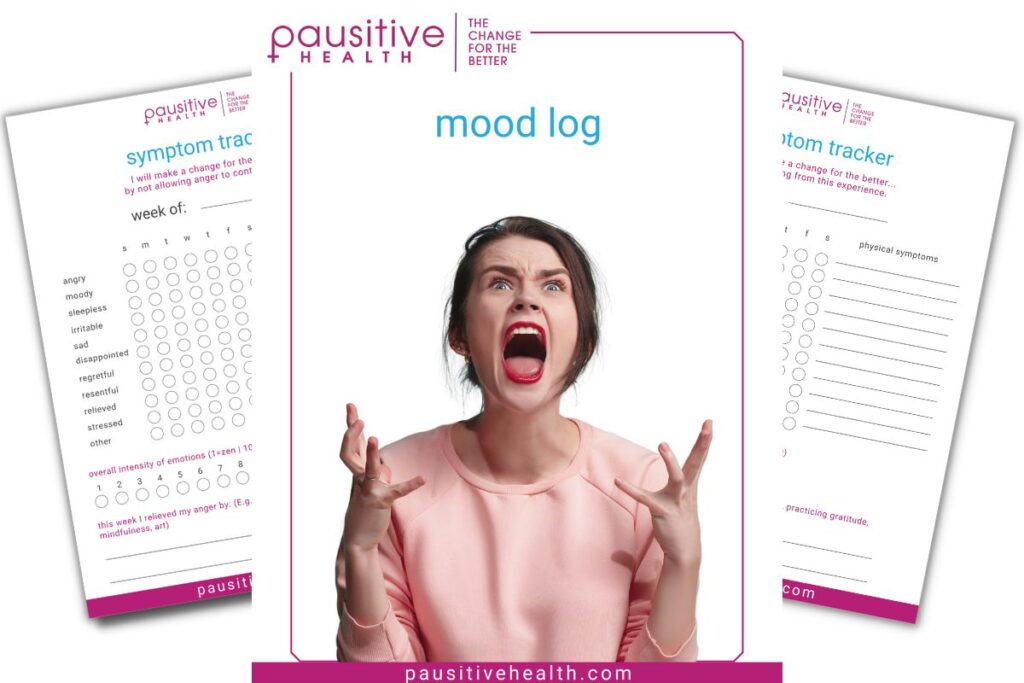Are you upset, frustrated, angry, or even full of rage? Do you know why? Perhaps you’re in menopause. There are many causes of anger, including disappointment, regret, love, uncertainty, and fear. And during the menopause journey, hormonal changes and emotional volatility, as well as several of the symptoms which appear during this stage of life, can also be the source or at least contribute to the picture. Recognizing the causes of anger will help you manage it better and make a difference in the actions you take to improve this menopausal symptom.
Why am I angry?
Have you ever asked yourself why you’re angry? Do you find yourself getting red in the face, throwing things, screaming at the top of your lungs when you’re alone, or yelling at people but don’t know why?
Anger is a secondary emotion or reaction triggered by the brain to protect you from vulnerability. It’s the brain’s defense mechanism against perceived threats to your well-being. That’s why anger is known as a secondary emotion.
It’s triggered by a primary feeling, one from which your brain is wired to protect you. It’s a process born of our primal fight-flight-or-freeze instincts.
In essence, your brain performs emotional triage, automatically. Within seconds of sensing “danger,” it prioritizes your reaction based on the perceived offense.
The American Psychological Association defines anger as “an emotion characterized by antagonism toward someone or something you feel has deliberately done you wrong.”
Therefore, to reduce (and hopefully eliminate) chronic anger, the kind that disrupts your emotional and physical health, you must identify the root causes and triggers of your anger.
Transformation rarely happens overnight, nor is it easy. But there are steps you can take to begin the journey that can ultimately help you convert the energy of your anger into meaningful action.
Finding what causes anger in your life
Of course, the menopause journey can be one reason for your anger.
The volatility and drop in estrogen levels can cause you to feel like you’re on an emotional rollercoaster, with feelings of rage, irritability, and mood swings.
Those can quickly fuel anger.
But hormones are not the only reason you feel the way you do. There are likely other triggers beneath the surface:
- Disappointment
- Regret
- Sadness
- Loss
- Love
- Uncertainty
- Fear
Anger and disappointment
Have you ever said to yourself I feel angry and disappointed? We all have at some point in life. If you tell yourself this often, consider what’s causing these feelings.
Anger and disappointment are closely related.
Disappointment is directly linked to a situation in which our expectations and reality do not match. The occasional disappointment doesn’t normally trigger anger. The unwillingness to accept the reality – that you didn’t get what you expected – can trigger anger.
So, in the case of a doctor who isn’t helping you manage your menopausal symptoms other than with medication even though you said you wanted to know about all options and when there are known non-hormonal options, your disappointment can turn to anger.
You’re disappointed you have to search for a new doctor, which isn’t always easy.
If you have a spouse/partner, you may be disappointed they don’t understand your menopause symptoms. You didn’t get the support you expected, so now you’re angry with the person you love.
Though lesbian relationships may have fewer issues with understanding the other person’s experience, that doesn’t guarantee there won’t be issues, particularly if both people are going through the journey at the same time and having a hard time of it.
You may be disappointed in your employer’s disregard for this stage of life. It’s no less important or life-changing than the maternity or infertility journey, and everyone with the applicable anatomy will go through menopause if they live long enough.
You may be disappointed in the solutions provided by the healthcare system. After all, doctors unfortunately often lack adequate menopause training.
Chronic disappointment leads to anger, even rage, depending on the specific situation and the frequency with which it occurs.
Dealing with regret
In addition to disappointment, you may feel regret.
Regret is longing to undo something we said/didn’t say or did/didn’t do.
Regret that you didn’t lose the extra pounds earlier in life. You may feel ashamed or embarrassed by your weight. Regret that you’re losing your fertility and that it may be too late to get pregnant if you want children in your life through your own delivery of a baby.
There can be considerably less pain in unleashing your rage on an innocent bystander than in confronting the disappointment you know awaits you at home or at work.
Perhaps you regret losing touch with friends while you were busy raising children or working hard to advance your career. Or you wish you had pursued a long-held dream instead of living someone else’s dreams for you.
Regret is a little more complicated in that it can also encompass other emotions – such as guilt, shame, embarrassment, grief, and remorse – or an amalgam of all those feelings
Anger is triggered at the intersection of regret and the inability to let go and move forward.
There’s likely a pivotal event or decision that was made along your way to menopause that you regret. Those old feelings or memories can be re-triggered during the hormonal transition, especially if your symptoms are moderate to severe.
Replaying events non-stop, getting stuck in negativity like blame and shame, and chronic disappointment can push you onto the path of self-loathing and rage.
Have you heard the sayings — “Live life without regret” or “What’s done is done”?
They sound good but are easier said than done. At the same time, they set us up for anger and the fear of failure when we regret something.
Journalist and author, Kathryn Schulz, sends a different message. In a powerful TED Talk, she says don’t regret regret. She talks about a big regret in her own life — getting a tattoo. Is there something you’ve always regretted?
Schulz talks about the valuable lesson learned from living with that regret.
When you regret something, you may let your imagination run wild with other potential outcomes. You play the “what-if” game with yourself.
Schulz uses the example of missing your flight. You might say, “What if I took a different route to the airport? What if I didn’t make that bathroom stop? What if I got up earlier in the morning?” You beat yourself up with how the situation might be different if you had made different decisions leading up to that moment when you missed your flight.
Anger starts to creep into your mind, and before you know it, you’re punishing yourself for making that decision. Instead, Schulz suggests coming to peace with your regret knowing it’s a natural part of life that we all experience.
That tattoo she regrets – well, millions of others regret theirs too. Take comfort in the commonality of your regret. It may not be easy to do in the moment, but with time you’ll feel better about it.
If you like the lighter side of things, and depending on the situation, work toward finding a way to laugh at your regret and find the humor in the situation. At the end of the day, it may not be as ugly or as painful a decision as you think it is. And there may be steps you can take to move forward in a positive way, e.g., apologize, commit to a healthier lifestyle, or reach out to old friends.
It’s all about your mindset and perspective when you’re dealing with regret. Focus on what you could’ve done better rather than what you did wrong.
Think about the glass-half-full analogy you’ve heard before. Are you a half-full or half-empty person? The different perspective changes how you feel – whether you’re optimistic and learning from the past or pessimistic and possibly growing angry as you let things fester.
Managing expectations
You may have noticed a common denominator in disappointment and regret: expectations.
With disappointment, we expected something different from reality.
With regret, we expected something different from ourselves.
So, one of the best ways to handle disappointment and regret, and by extension, curb chronic anger, is to confront your internal and external expectations.
Think about the last time you felt disappointed. Ask yourself, “What was my expectation? Why? Was that a realistic expectation?”
Be honest with yourself, especially when dealing with menopause-related anger.
Are you expecting too much of yourself when you’re not sleeping, experiencing hot flashes, having constant aches and pains, are fatigued, or having other symptoms that can come with menopause?
Reflecting on your regrets helps you avoid doing the same thing again. Take responsibility. Without regret, how would you know the kind of person you truly want to be?
We all make mistakes; they’re inevitable. But the choice to reflect on those mistakes is completely within our control. Choose wisdom. What can you learn from that experience? Reflect. Learn. Adjust. Move forward.
In “Expectation Hangover,” Christine Hassler helps you navigate life’s curveballs to overcome disappointment in work, love, and life. She uses guided meditations, inspiring true stories, and powerful exercises to transform your “expectation hangover” so you can reduce or prevent further and future disappointment.
None of us are perfect people. When you learn from your regrets, you’ll find it easier to forgive yourself for making them and find a path toward happiness and gratitude for the lessons learned rather than anger.
Sadness during menopause
Disappointment and regret often cause us to be angry. They feed into another primary emotion, sadness.
Many of us will go to great lengths to avoid being sad. However, at its core, sadness helps us reflect on and learn from our loss. This dogged avoidance tactic is why so many of us stay angry rather than feel the reality of being disappointed.
For example, it can be easier to be mad than deal with the disappointment of betrayal by someone you trust.

Love and anger
Love can also cause anger.
Perhaps you’re angry at your spouse. By midlife, you may have been married a few years and have fallen out of sync, or perhaps you’re divorced or just mad at a current partner.
Even if your marriage is healthy, you may find your partner doesn’t understand “the menopausal you.” Support may be lacking or s/he may be frustrated by the symptoms that have arisen as a result of the hormonal transition.
Love is a powerful emotion, but maintaining can be difficult from time to time, especially once you’ve been together for a while.
Anger can quickly and easily drive a wedge between you and another person in a relationship. That can be a romantic relationship, friendship, or another bond.
Remember, anger is a secondary emotion and a defense mechanism of sorts.
Hot flashes, night sweats, and palpitations can combine to make getting good sleep a challenge. In turn, less sleep can lead to poor eating habits, insufficient exercise, weight gain and less patience than is usual for you. Love is complicated, and there are many reasons it can trigger anger. Besides low or volatile moods, you may be discouraged.
The more you love someone, the angrier their actions may make you because you have higher expectations for that person. So, you may be more disappointed if they’re not supporting you during your menopause transition.
There are ways to avoid having love turn into anger. It all starts with understanding what love means to you.
Even if someone you deeply care for caused you anger, it’s possible to heal that wound and find love after anger.
Find a way to express yourself to that person. Don’t let the anger and feelings of resentment and frustration build up inside. Find a way to let it go.
Whether that’s exercise, a gratitude journal, conversation, or mindfulness – let it go! Don’t bottle up your feelings or try to hide them from those you love.
Accept yourself for who you are at that moment.
Knowing what’s happening to your body may help you and the ones you love to better accept the anger without judgment.
Look at anger as a potentially positive force. Perhaps it’s why you reflect on your relationship and look for ways to improve it.
Perhaps you seek the advice of a therapist, attend a couples’ workshop, find ways to reconnect with friends, practice random acts of kindness, and resume date nights that may have fallen by the wayside.
Like every other phase of life, this too shall pass. The menopause transition can last 10 years or more, so it’s not to be taken lightly. The anger may not pass quickly, but when you learn to release and manage it, you’ll be in a better position to move forward sooner.
Know that love is a two-way street. You can’t expect to be on the receiving end if you’re not also expressing love.
Anger and loss
Perhaps you’re angry because you’re grieving what you’ve lost as you go through the menopause transition.
You’re no longer in your reproductive years. Although you may have no interest in having a biological child at this point in your life, knowing you no longer can do so, may still feel like a sense of loss.
You may also be grieving the loss of a full household, as your children may be gaining independence or making you an empty nester when you feel you aren’t yet ready.
Society glorifies pregnancy, and menopause is stereotyped as something belonging to older, aging women and a time when life is behind them.
Perhaps you crave that younger-looking self and are trying to cover up wrinkles or gray hair. Although during the COVID-19 pandemic many people became more comfortable with who they were and how they looked, regardless of any physical changes, and there is a greater focus on the menopause journey, there very much remains a stigma around the menopause years. And unfortunately, it’s all too easy to internalize the negative social messaging.
Embrace yourself for who you are now, and resist the temptation to get stuck in the past. Don’t let society tell you how to feel.
In some cultures, the status of women+ as they age actually increases in society. They are viewed as fountains of wisdom and, in some countries, are viewed as sexier than ever.
Fear and anger
Uncertainty drives fear. It’s so deeply rooted to anger, too, that some call anger management fear management.
There are many ways to manage your fears so you don’t get angry. Once again, you have to embrace your feelings, in this case, fear. Hiding from it won’t make it go away, and it won’t make it easier to face it.
To overcome these challenges, you must work through them and realize they’re a normal part of life. These emotions are not going away. You have to learn to manage them rather than letting them control you.
Workplace anger
There are many situations in which angry feelings may arise. One of them is one where you spend many hours of your life, the workplace. Let’s face it, going through menopause at work can be difficult.
Instead, women often suffer in silence, embarrassed to tell their boss they’re not sleeping or having hot flashes, or afraid the changes that can ensue during the menopause journey will impact job security or opportunities to advance.
There is momentum with menopause-friendly policies in the workplace in the United Kingdom. The United States lags, but being silent isn’t going to get you anywhere.
Speak up and be one of the voices of many other women+ in your company.
A letter was initiated by G2G for the House and Senate health committee leaders for Ways & Means and Senate Finance Committee advocating for Congress to provide increased access to care for menopause by eliminating co-pays and deductibles related to menopause treatments and doctor visits. The bill, H.R.6749 – Menopause Research and Equity Act of 2023, was introduced in December 2023 but must be passed by the House and Senate and signed by the President before it would become law.
Uncertainty
Think back to perhaps one of the most uncertain moments in history – when the first people came down with COVID-19, and the world shut down. At that time, we had no idea what the future held. There were no vaccines and no antibody treatments. In fact, there was no known treatment at all for the deadly and contagious virus.
The things we take for granted every day were suddenly in jeopardy. Together as a world, our sense of “normal” changed immediately.
People reacted with fear, clearing store shelves of basics like Lysol wipes and toilet paper.
Once the initial fear wore off, anger and frustration mounted over the “new normal.”
While times were difficult for a long time and are still challenging for many, especially those with long COVID or women+ whose health was impacted, we’ve made tremendous progress.
During the menopause journey things can feel uncertain, especially if you feel unprepared or feel like you can’t find the help and care you need. Fear of the unknown and frustration with the major changes the menopause transition can bring can lead to anger.
It’s impossible to avoid all the uncertainties in life and the future can be filled with the unknown.
While uncertainty can make you anxious, try to find a way to embrace it. It’s uncomfortable and scary, but often opportunities open up in the middle of chaos and change.
That’s what pausitive health is all about – making a change for the better!
And in the midst of uncertainty, focus on those areas over which you do have some control. For example, this can be a time to practice as healthy a lifestyle as you can – coping skills to help you manage stress, strengthening friendships and family relationships, healthier eating, good quality sleep of sufficient duration, and regular physical activity (aerobic exercise, balance and flexibility, strength training/weight-being exercise).
Depending on your mindset, the menopause journey can be transformative and a path to the vibrant years which lie ahead of you.
You can come out of a difficult and uncertain time a stronger person if you don’t let fear and anger take over.
Perhaps you’ve discovered a way to thrive in the new normal, or you’re still searching for the right path forward. You’ll get there.
You can do this!

10 ways to manage anger
Change is possible. Make a decision to turn your anger into a positive force, so you can enjoy a happier life.
Here are 10 ways to help manage anger:
- Reflect on your anger and accept it.
- Find out the cause.
- Practice emotional first aid.
- Shift your mindset.
- Practice gratitude.
- Live in the moment.
- Be kind to yourself and your body.
- Reach out to others.
- Use Emotional Freedom Techniques (EFT), aka tapping.
- Let it go.
Click on the section above that interests you most or read all the ways to manage anger.
1. Reflect on your anger and accept it.
The first step in your anger management plan is acknowledging your feelings and owning them without judgment. If you’re here, you’ve already acknowledged them. Now, accept them without judgment.
There is a broad range of emotions that can surround our feelings. Some people share to the point of TMI (too much information), while others are uncomfortable sharing anything at all.
But regardless of which camp you may fall into or anything in between, there is much to be gained by acknowledging our emotions and seeing what can be learned to bring us gracefully into the future.
Here’s why this is so important.
For every minute you remain angry, you give up sixty seconds of peace of mind.
~ Ralph Waldo Emerson
Think about this for a second. Anger is stealing moments of your life that you won’t be able to get back.
Accept yourself for who and where you are at this stage of life.
2. Find out what causes your anger
Even if you think you know the cause, multiple forces may be working together to make you angry.
Take time to reflect, and track your anger. When you feel your blood boiling, write down the time and trigger.
Track the date, day of the week, time, duration, intensity, trigger, and physical symptoms.
It is likely that, in the moment, the last thing on your mind will be capturing this information (although it might serve as a “circuit breaker” if you do). So, spend 5 minutes at the end of the day completing your entries.
You may be surprised by the patterns that may become clear when you review your anger log at the end of the four weeks.

Get Relief From Your Emotions
Having mood swings? Track how you feel, identify your triggers, and find ways to calm the emotional firestorm with this mood log.
"*" indicates required fields
There are other potential reasons you’re feeling the way you do.
You may be upset about weight gain, moodiness, leg pain, hot flashes, cold flashes, or other menopause symptoms. You may be dealing with emotions related to your career or personal life. During the hormonal transition, there’s a confluence of personal and professional events that can leave you feeling upset or depressed. (And in some people, depression may show up as anger.)
Are you feeling disappointed about a situation or regretting something? Is it love, fear, uncertainty, the loss of “normal”, or the reality that life can be unfair?
Recognize that many events can dramatically alter the course of your life and may cause anger. It may start as frustration and, over time, boil over into anger or even rage.
You may not see the cause(s) immediately. For example, it can be hard to see that fear is causing anger, yet it’s so common that one psychologist calls anger management fear management.
It may take soul-searching and learning to discover the reasons you grow frustrated, become irritable, and lose your temper. However, figuring out the root cause is an important step.
And be honest with yourself about any role you may play in perpetuating the pattern.
An anger log is a great exercise for controlling your anger. It provides valuable information so you can develop an anger management plan and shift your mindset.
After a week, reflect on all the causes of your anger. Find the common themes. Are they disappointment, regret, love, uncertainty, or fear?

3. Practice emotional first aid
Remember this is a process. Just like a wound doesn’t heal immediately, the sources of your anger won’t disappear overnight.
Practice what psychologist Guy Winch calls “emotional first aid.”
You’re feeling emotional pain because it’s your body’s way of telling you something is wrong. Think of it like a wound.
Start by triaging your emotions. Then, managing the wound and letting it heal.
4. Shift your mindset
Shift your emotions by changing your mindset.
Remember, for every minute you’re angry, you’re giving up peace of mind.
Shifting the way you think from negative to a more positive outlook is simple in principle but not so easy to do. However, putting in the effort can bring powerful change to both your emotional and physical health!
Do you think of the glass as half-full or half-empty? If you’re angry often, it’s probably empty. Once you recognize this is your perspective, try to shift your outlook so the glass begins to fill.
This may be challenging during menopause when you feel like you’re on an emotional rollercoaster, but it’s possible. You can manage menopause, so it doesn’t rule you life!
If it’s truly hormonal changes causing you to feel the way you do, reconsider how you may be feeling about this time in your life. It’s no longer your grandmother’s menopause – the taboo is fading, and people are becoming more outspoken about the shifts during the menopause transition.
It hasn’t risen to the point of talking about menopause with your manager at work, at least in the United States, but that shift is coming too. There’s already momentum in the United Kingdom with policies and a menopause-friendly workplace certification.
There are reasons to be optimistic about menopause, with the many options available to address symptoms – both hormonal and non-hormonal – and a growing awareness of the importance of providing support to those on the journey.
The narrative is changing. It can be a time to say yes to the life you have and the years ahead.
5. Use the power of gratitude to your advantage.
Focus on the positives in your life and the world around you. Gratitude can be the prescription for better physical and mental health and improved well-being, especially during a difficult time.
Gratitude is a type of positive psychology. You focus on the silver linings in life rather than the difficulties, frustrations, regrets, and resentment. That mindset shift can instantly bring a smile to your face or a sense of calm, even amidst the toughest circumstances.
Still trying to figure out where to start? Try these 20 gratitude ideas designed for difficult times in your life and others.
There will inevitably be setbacks. When you find yourself falling back into a rut, redirect your feelings before one problem snowballs and leads back to emotional turmoil. Psychologist Guy Winch calls this practicing emotional first-aid. You stop the emotional spiral early, or it’s more difficult to stop it.
When you feel like you have failed, try to find a silver lining. If you focus on the negative, Winch points out, you’re less likely to perform at your best. You focus once again on negative feelings, starting the cycle all over again.
As Winch says to gain wisdom from that loss. It’s part of practicing emotional first aid. It may take time, but there are lessons to be learned. Find them so you can live a more purposeful life, and don’t allow your emotions to snowball.
Remember to give yourself grace. You’re going through a lot, but approach it believing “this too, shall pass.”
Pema Chödrön’s book, Don’t Bite the Hook, also helps you see a path out so you don’t bite the “hook” and enter into habitual and destructive behavior.
Gratitude and compassion can help you stay centered and awaken one’s compassion for yourself and others so you can avoid the downward spiral.
So, when a triggering moment happens – like a hot flash in a meeting, an unsympathetic boss, or a comment from your partner that really irks you – don’t bite the hook.
Take a breath and a few more if needed!
Your body will thank you for turning a tense situation into a moment of calm.
6. Live in the moment
Living in the present is a powerful way to see your way through your troubles. Give it a try.
For most people, most of the time things are at least neutral and at least good some of the time when it comes to what really matters at the end of the day. By stringing each of these moments together, you begin to get a broader perspective and enjoy more moments in life.
First, focus on shifting your mindset once a week. If something goes wrong, take a breath and decide if it’s important enough to strain your physical and mental health.
Do this once a week, then twice, and so on. Slowly change your thinking.
There are blessings to be found, even when life is at its worst, like during the pandemic.
If you experience chronic anger, this mental shift won’t happen overnight. Take it one step at a time. Small steps eventually lead to bigger ones.
7. Be kind to yourself and your body
Once you recognize the causes of your anger, find ways to address them. That starts with being kind to yourself. Remember, give yourself grace.
Compassion goes a long way in avoiding or taking on baggage like guilt and resentment.
Also, focus on you! Physical activity is an excellent way to release tension and resentment. Get enough sleep and eat well.
Don’t underestimate the power of healthy eating. Think of food as medicine. Eat foods rich in the vitamins and nutrients menopausal women need.

Make A Change For The Better!
This menopause grocery list contains a combination of foods specifically selected to help you feel better today and even better in the future.
"*" indicates required fields
Experiment with tools to clear your mind. Try meditation or mindfulness to redirect yourself when a situation hooks you!
All these techniques can also improve your overall well-being during menopause.
If you sleep more, you may have more patience when a situation arises that typically makes you angry. If you practice a technique like mindfulness, you’ll be able to quickly notice changes in your body that alert you to the triggering effect before it takes hold.
The more you do to make a change for the better, the better off you’ll feel, and more easily you’ll be able to manage your anger.
Most things are possible when you set your mind to it. Just think of Susan Boyle. The Scottish singer rose to fame after her inspiring and moving rendition of “I Dreamed a Dream” on Britain’s Got Talent TV show. At age 47, this ordinary woman unexpectedly launched a best-selling album.
Believe in yourself!

8. Reach out to others
If you’re a frequent complainer or are frequently angry, you may feel a bit isolated as others realize this and are reluctant to spend time with you.
When you start to make the changes needed to work through your anger and manage it effectively, you’ll experience a shift, and feelings of anger will be less frequent visitors. Reach out to others and show off your more relaxed and happier self. Find someone with whom you can share your feelings and concerns. Sometimes that person may be in the most unlikely place.
People won't have time for you if you are always angry or complaining.
~ Stephen Hawking
Reaching out to others may help you open up to trying new techniques to manage how you feel. Connect with other women+ going through menopause – whether it be in-person or through online support communities.
In the Academy Award-nominated movie and international bestselling book “A Man Called Ove,” the isolated and angry widower had all but given up on life. Then, he unexpectedly connects and bonds with his neighbors. The story takes you on a journey of exploring the connections we build with others and their impact. The movie drives home the point that connecting with others can make all the difference!
9. Use Emotional Freedom Techniques (EFT) to cope with anger
EFT, also known as tapping, can help you release the anger that’s holding you back and negatively impacting your health and well-being. It’s a form of psychological acupressure.
With EFT, you tap your fingertips on specific points on your body like your head and chest while you think through a problem or emotional pain and voice positive affirmations. EFT can be used to help with several menopause symptoms, including anger and sleeplessness.
When you tap, focus, and voice positive thoughts, you help clear the emotional clutter and restore your mind and body’s balance.
Here’s a video with EFT practitioner Julie Schiffman.
Holding on to pain, anger, guilt or shame is the glue that binds us to the situation we want to escape.
~ Lyanla Vanzant
10. Let it go
Finally, let it go. It’s often liberating! You can walk away from the situation, agree to disagree, or clear your mind with mindfulness or another relaxation technique.
When you dwell on a problem, going over it again and again in your mind can stir up the feelings you had and lead to anger. So, letting it go will help you move on from the situation and prevent your irritability from bubbling to the surface the next time there’s a trigger.
Finding happiness within
Anger is a very human emotion and has many faces, from irritating to stony silence to screaming at the top of your lungs. It can also be a warning sign that you need to make a change or serve as a driver for positive action.
So, recognizing that reality and armed with facts and the power that knowledge brings, it’s now up to you to decide what you will do.
Call 9-8-8
Ask yourself these 4 questions as you seek to find happiness within:
- Are you willing to be honest with yourself and authentic with others?
- Can you do the challenging work of evolving your relationship with anger so you can tip the scales in favor of positive action?
- How will you be more compassionate with yourself so you can be more compassionate with others?
- Are you willing to let go and have faith there will be a net to catch you?
As you embark on this journey of managing your anger, you’re on your way to finding a life filled with greater ease and a more powerful sense of control and well-being.
There’s a sense of buoyancy that can come from laying down the heavy burden of the negative energy and leveraging your anger to transform it into a positive force for good for you and the world. Never underestimate the ripple effect one small action can have.
Start by making a change for the better.

Free Support
For Your Menopause Journey!
Only available for a limited time!
Access a one-stop menopause journey digital destination that provides personalized text messages that focus on educational topics you select and offers many other features such as a diet assessment with recommendations, solutions from collaboration partners to address menopausal aches and pains (the musculoskeletal syndrome of menopause – MSM), pelvic floor issues, virtual care, lifestyle tools, and a supportive community.
Berga SL, Garovic VD. Barriers to the Care of Menopausal Women. Mayo Clin Proc. 2019 Feb;94(2):191-193. doi: 10.1016/j.mayocp.2018.12.016. PMID: 30711116; PMCID: PMC6597249.
Anger | American Psychological Association
Don’t regret regret | TED Talk by Kathryn Schulz [VIDEO]
Expectation Hangover: Overcoming Disappointment in Work. Love, and Life | Christine Hassler
When Love Turns to Anger | Institute for Faith and Learning at Baylor University
Menopause Letter to Congress | Google Docs
How to Manage Uncertainty So You Don’t Get Stressed or Angry | PeopleTweaker
Frustrated with the “New Normal?” Here’s How to Fix It and Thrive | PeopleTweaker
5 Things to Do When You’re Angry Because Life Isn’t Fair | PeopleTweaker
Anger Management is Fear Management | HuffPost
7 Ways to Practice Emotional First Aid | TED Conferences, LLC.
Say Yes to the Life You Have | PeopleTweaker
20 Ways to Be Grateful and Kind During Difficult Times | PeopleTweaker
Don’t Bite the Hook | Pema Chödrön [Audio CD]
How Technology Affects Our Happiness and How to Fix It | PeopleTweaker
Susan Boyle | Sony Music Entertainment
A Man Called Ove | Simon & Schuster
Powerful Ways to “Let Go” of Your Painful Past So You Can Find Happiness Today | PeopleTweaker
Releasing Anger: EFT Tapping with Julie Schiffman | Julie Schiffman [VIDEO]
You May Also Like…

Menopause Rage Is Real! How To Tame The Beast Inside
Do you feel menopause rage? Learn how to tame the beast inside and control your emotional symptoms, including anger, during menopause.

Why Anger Problems Are Bad For Your Health
Anger is yet another menopause symptom, but anger problems are bad for your health, leading to depression and other health concerns.

The Surprising Benefits Of Anger: How It Can Actually Increase Positivity
Do you become angry at a moment’s notice? Anger is a powerful force during menopause. Learn how to transform it into positive action.

